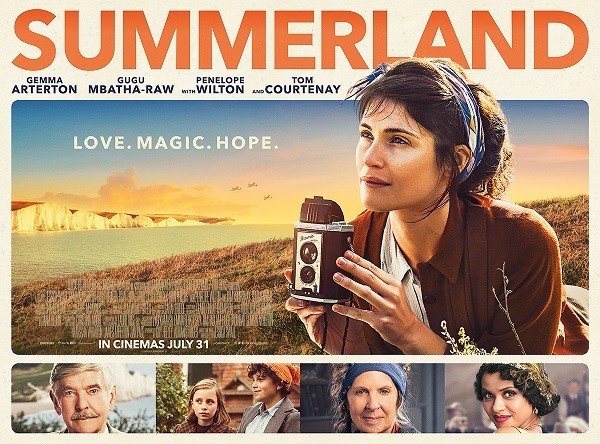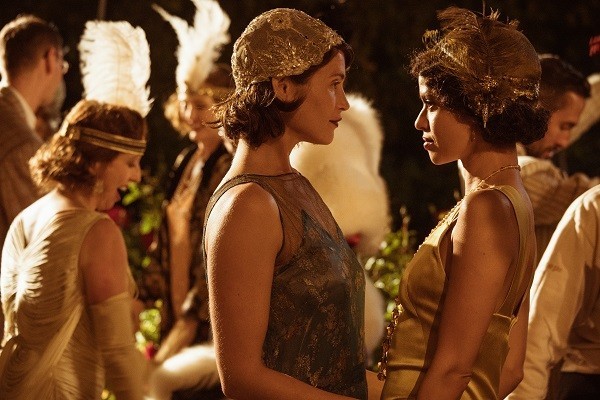Summerland, 2020.
Written and Directed by Jessica Swale.
Starring Gemma Arterton, Gugu Mbatha-Raw, Penelope Wilton, Sian Phillips and Tom Courtenay.

SYNOPSIS:
Isolated academic Alice Lamb (Gemma Arterton & Penelope Wilton) shuns convention, frowns on slovenliness and keeps people at a distance. Wartime brings its own responsibilities and soon her icy demeanour is compromised by Frank (Lucas Bond) an unexpected arrival…
This debut feature from writer director Jessica Swale possesses a stylistic assurance from the outset, which establishes time, place and premise with economy. Switching seamlessly between Penelope Wilton and Gemma Arterton as Alice in the opening minutes, Summerland is a layered character piece of emotional repression. Perched on a cliff top, entrenched in her academic study and isolated from village life Alice Lamb is a social enigma.
Unmarried, unconventional and uncaring of public opinion she is forced to adapt upon the arrival of an unannounced evacuee from London. Stripped of make-up, free of social expectations and beholden to no one Arterton is a revelation. Her demeanour is barbed wire, her exchanges witheringly curt and she is consistently dismissive of the close knit community that passes judgement. Alice is consumed by research and perpetually punching out prose using that knowledge to fill time, kill hours and keep any emotional connections at bay.

Swale keeps both tone and character perfectly balanced through a combination of pithy dialogue, situational comedy and judiciously implemented flashbacks. After an initial rejection of Lucas Bond’s refugee Alice drops her cast iron defences as these two characters begin to bond. Both child actors display a naturalism which makes emotional investment easy, while Swale’s choice of location only disarms you further.
Flashbacks come fleetingly at first and then expand as Alice relives moments of intimacy through memories of a Mozart recital. Gugu Mbatha-Raw does a great deal with very little screen time, establishing those first sparks of attraction between herself and Arterton, before romance blossoms in glimpse of stolen tenderness. Swale handles the switch in time period, tone and place with delicacy which only adds weight to any drama that follows.

What consistently sets Summerland apart is its innocent depiction of small town mentalities which applied not just in wartime, but continue to dominate contemporary society. What makes this film such a pleasure is in the transparent nature of these intimate relationships which playfully mock without passing judgement. Much will be made of the sensitive handling of its central lesbian love story, but ultimately their relationship is just one of many which makes this wartime melodrama work so well.
With sharply defined characters, an engaging premise and performances which consistently keep things grounded, Summerland confirms what others already know. That Jessica Swale now represents a dramatic triple threat in television, on stage and through cinema.
Flickering Myth Rating – Film: ★ ★ ★ ★ / Movie: ★ ★ ★ ★
Martin Carr










